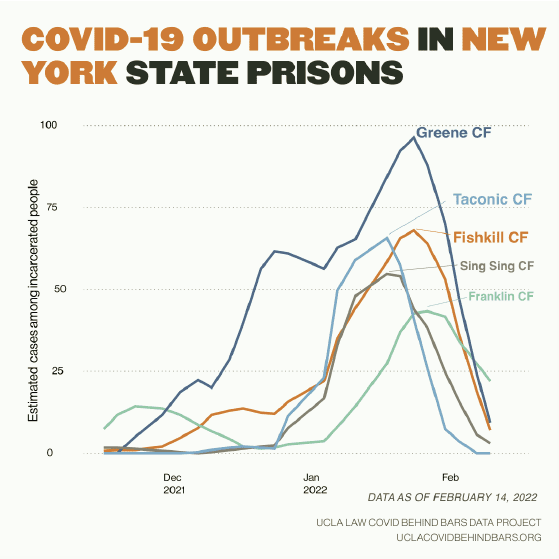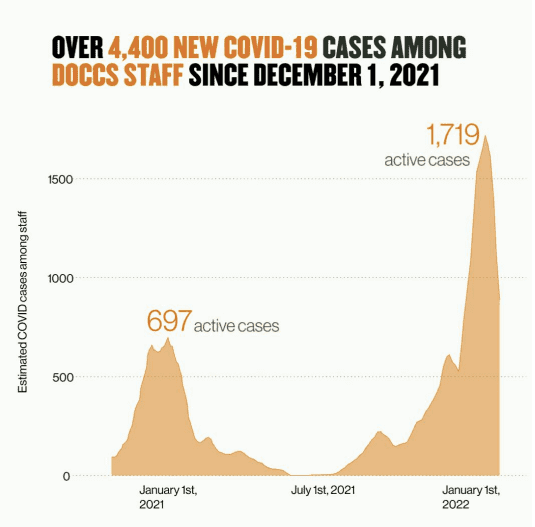February 24th, 2022
Letter to New York Legislators: Pass The Elder Parole and Fair and Timely Parole Bills to Protect Public Health
On February 24, 2022, we sent a letter to the leadership of the New York State legislature in support of two bills, the Elder Parole Bill and the Fair and Timely Parole Bill, that would reduce the number of people in New York State prisons and thus lessen the risk of COVID in state prison facilities.
The text of our letter is below and a PDF of our letter is available here.
_____
Dear Speaker Heastie and Senator Stewart-Cousins:
As prison health policy researchers, we write in support of two pieces of pending legislation, the Elder Parole Bill (S.15A/A.8855A) and the Fair and Timely Parole Bill (S.7514/A.4231). These two critical bills will help to reduce the number of people in New York prisons. Population reduction is essential during an ongoing public health emergency because crowding has been a major source of contagion in carceral settings. The passage of this legislation will aid your efforts to gain control of the pandemic in these congregate settings. We hope you will soon put the bills on your committee agendas and onto the floor for a vote.
Since the start of the pandemic, the UCLA Law COVID Behind Bars Data Project has studied the impact of the pandemic on people who live and work behind bars. Our Project serves as the Center for Disease Control and Prevention’s contracted provider of official COVID-19 data from prisons, jails, youth facilities, and immigration detention centers across the United States.
Prison crowding remains a major threat to public health in New York state prisons: to the people incarcerated, those who work there, and those living in the surrounding communities. Social distancing is difficult or impossible in these densely packed institutions. Moreover, ventilation is poor and protective equipment like KN95 masks are still not available to incarcerated people in New York.
In December 2021 and January 2022, we once again witnessed the dangerous and even deadly consequences of a failure to reduce the number of people in New York prisons. Crowding, poor ventilation, lack of access to PPE, and low rates of vaccination in prisons and among staff set the stage for yet another wave of widespread infection during the Omicron surge. Statewide, the number of cumulative cases among people incarcerated in New York has risen from 7,232 to over 10,000 since Omicron was first detected in the United States. Eight incarcerated people and three DOCCS employees have died from COVID since December 2021 across Mohawk Walsh Regional Medical Unit, and Albion, Attica, Riverview, Sing Sing, and Fishkill Correctional Facilities.
Statewide, there have been 4,348 new COVID cases among DOCCS employees since December 1st and three new deaths among staff members.
The Elder Parole Bill would give older adults, defined as aged 55 and older, who are incarcerated in New York, a chance for parole regardless of their crimes, as long as they have served at least 15 years of their sentence. New York has the second-highest number of people in prison serving parole-eligible life sentences and is one of five states with more than 10,000 incarcerated adults aged 55 or over. Passage of the Elder Parole Bill will help to relieve crowding and thereby reduce the threat of mass COVID outbreaks. The bill helps public health in two ways, by reducing the prison population to reduce the spread of disease and chances of outbreaks, while also protecting a population most vulnerable to severe outcomes from COVID infection.
Lack of access to parole has had life-threatening consequences for older people in New York prisons. Even absent a pandemic, health outcomes for older incarcerated people in prisons are abysmal. Older incarcerated individuals have high rates of diabetes mellitus, cardiovascular conditions, and liver disease. Elderly people in prison are among the most vulnerable to severe illness, hospitalization, and death from COVID, yet few have been released in this period. The Elder Parole Bill would also take a small step toward fostering racial equity in our penal system. Most elderly incarcerated people are Black or Latinx, having received lengthy sentences at rates that far outpace their white peers.
Research shows that providing pathways to parole for this population does not endanger public safety. Elderly people have the lowest recidivism rate of any age group, dropping to just about two percent in people aged 50-65, and to close to zero in people 65 and older.
The Fair and Timely Parole Bill makes amendments to the existing parole law. It would require parole to be offered to incarcerated people who are eligible unless they pose a risk that cannot be handled by parole supervision. The act allows for a more meaningful parole review process for incarcerated people who are already eligible for release.
The passage of these two bills would help to reduce the number of people behind bars in New York, thereby benefiting all New Yorkers by reducing the risk of widespread outbreaks in prisons, and in surrounding communities. Communicable diseases like COVID do not stay within prison walls, and COVID outbreaks in prisons lead to infectious spread on the outside.
These bills cannot be put to a vote too soon, with the steep rise in COVID cases and deaths in New York prisons:

Case Increases Among Incarcerated People (since 12/1/21):

The crowded conditions in New York prisons are leading to widespread illness and death among incarcerated people and employees of the DOCCS. It is critical that New York legislators act to create pathways for timely parole for people who can be safely released from prison. The Elder Parole and Fair and Timely Parole Bills will help the state of New York gain control of the pandemic, and will protect the health and safety of all who live or work in DOCCS facilities.
next post
March 4th, 2022
Testimony to New York City Council on COVID in ICE Detention Facilities in New York and New Jersey
This week, our staff provided testimony to the New York City Council Committee on Immigration about the crisis of COVID in ICE detention facilities in New York and New Jersey. Here is what we said.